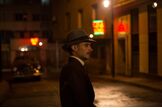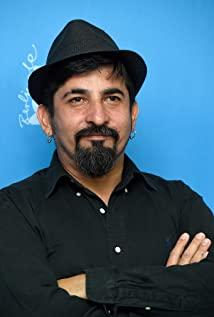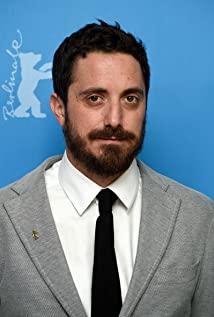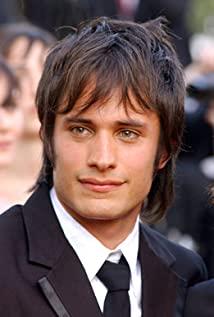your devotion to me is like the world.
My rough peasant body digs you
and makes my son leap from the depths of his arrogance.
I was lonely like a tunnel. The birds flew away from me,
and the night overwhelmed me with its mighty invasion.
To survive, I forged you like a weapon,
like an arrow in my bow, like a stone in my slingshot.
But the time for revenge has come, and I love you.
This article comes from the king of love poems, Chile's greatest poet, Pablo Neruda.
Neruda began to publish his own poetry at the age of 13. In 1923, he published his first collection of poems, Twilight. The following year, he published his world-famous work, Twenty Love Poems and a Song of Despair. .
"Twenty Love Poems and One Desperate Song" is known as the "Bible of Love Poems" and has sold more than 100 million copies worldwide.
Neruda was named "the greatest poet of all languages of the 20th century".
The reason for winning the Nobel Prize for Literature is: "Poetry has the role of a natural force, reviving the fate and dream of a continent".
"Love is so short, forgetting is so long"
"I like when you are silent, because you don't seem to be there"
A poet who can use words to make people climax.
In addition to celebrating love and sex, Neruda's life has a theme, that is, politics.
In the middle and late stages of his life, Neruda entered the political arena. In his later years, he suffered from exile, exclusion, and betrayal from his hometown. But he always maintained a passion for revolution, a consciousness that permeated his poetry.
During his exile and return to China, he composed "Manga Collection". He interpreted his political ideals and attitudes with a beautiful fusion of poetry, creating a precedent for political poetry.
How to express Neruda's legendary life by visual means other than words is definitely a difficult re-creation work.
Chilean director Pablo Larrain, who has directed biopics "The First Lady", "Club of Priests", "Chile Says No" and other films, used montages to combine reality and reality to present us with a charming and relevant poet. The Fantastic Story of Pablo Neruda.
His latest film, The Hunt for Neruda, tells the story of Neruda in 1948, when he was ostracized by the local government and forced to flee.
The most surprising part of the film is that it uses dreamlike editing methods, combined with Neruda's words, to tell a story about "hunting" in a poetic way.
From the title, we can clearly see the ingenuity of the director. The entry point of the whole story is not directly on Neruda, but with another person's "hunting", from the side, from the perspective of others Present us with the image of Neruda as a romantic poet.
When constructing the image of Neruda, we also saw another character, the character construction of the police officer Oscar Pelucianu, which came from his inner conflict, identity anxiety, advancing the plot, and enriching Nie Li in a mirrored way. Image of Ruda.
The main story of the whole film is actually the identity experience of police officer Oscar Pelucianu. In the story, his character arc transformation is the backbone of the narrative.
The film's narration, Neruda's poetry, and the constant intertext between characters and lines constitute a dramatic conflict, blurring the real and the false, making people completely addicted to the precise construction of the narrative.
"Chasing Neruda" seems to tell the story of the arrest of Neruda by the police. In fact, Neruda succeeded in "arresting" the police with his absolute spirit, extraordinary personal charisma, and breathtaking poetry. The story of Oscar Pelucianu.
The story line of the film is very simple. In 1948, Neruda’s political ideas were squeezed out by the political forces represented by the aristocratic group in the country. He was regarded as a national fugitive, and the policeman Oscar Pelucianu was ordered to carry out the arrest operation.
After creating messages, splashing dirty water, and risking force, police officer Oscar Pelucianu had mixed feelings for Neruda. This arrest allowed him to gradually see his true self and his your inner desires.
In the film, Oscar Peluccianu's self-identity undergoes three distinct shifts during the arrest.
At the beginning of the film, we haven't seen Oscar Pelucianu, we only hear his narration, hearing his prejudice against literati like Neruda, his corrupt life, and his association with alcohol and women.
When he first appeared, he referred to the sculpture at the center of the police station, the founder of the Chilean police system, as his father.
He sees himself as the son of a policeman!
But the arrest was unsuccessful, Neruda was protected by political forces, and Oscar Pelucianu's arrest was always late.
Everywhere he went, he would find the novel that Neruda had left him, which was also a novel about arrests, with criminals and police in it.
The only time he nearly caught Neruda was in a brothel.
It is a pity that Neruda was not only protected by political forces, but even the people loved him, fell in love with him, and protected him.
The encounter in the brothel reminded Oscar Pelucianu of his origin, a commoner, his mother was a prostitute, and he did not know who his father was.
Oscar Pelucianu's identity changes, he hates himself, he says that all his sons of prostitutes are the sons of venereal diseases.
It is precisely because of the lack of fatherhood that his self-identity is always swaying.
Oscar Peluccianu could only know Neruda's image from other people's mouths. This image became a second-hand image construction through his personal experience. It is not so much that he is arresting Neruda, it is better to say that he is. He is capturing the lost "fatherhood", capturing the source of his life, capturing his self-identity!
The climax of the second act of the film, Oscar Peluccianu captures Neruda's second wife, she tells Oscar Peluccianu that you are just a supporting character in Neruda's novel, created by Neruda about you.
At this moment, Oscar Pelucianu has a huge inner wave, and literary works encourage readers to identify with the characters by showing things from the characters' perspectives.
We become ourselves in identification with the characters we read.
Throughout the arrest, Oscar Peluccianu was always full of desire, the desire to find his roots, and the desire to find himself.
It is this "pre-existing" desire that realizes the identification! Let identification be the existence of a subject full of desires!
The entire story of "The Hunt for Neruda" is driven by Oscar Peluccianu's desire for identification.
In scene after "mirror phase" of Oscar Pelucianu looking into the mirror, he forms his new identity.
In the climax of the end credits, Oscar Pelucianu is betrayed, lying in the snow as his life seems to be coming to an end.
He finally saw the target of his arrest, Neruda himself, and he exuded joy, forgetting life and death.
At this time someone asked Neruda, "Do you know him?"
Neruda said, "I don't know."
After thinking about it, Neruda said again, "Know!"
Neruda did not know Oscar Peluccianu's past, when he recognized his present, Oscar Pelucianu had become an independent absolute spirit, nothing but everything at the same time.
I don't know who Oscar Pelucianu is, but I know him.
At the end of the film, Oscar Pelucianu's self-identification is, I am the son of the people!
In fact, this arrest is a two-way street.
On the one hand, Oscar Pelucianu completed his identity in the process of arresting Neruda, and at the same time, Neruda also completed the transformation of himself from a poet of love to a poet of revolution!
He went from a lover to a revolutionary.
That passionate "Man Song", his great creation in exile, is the best proof that he has completed the transformation of his identity.
In the "Manga", Neruda's creative intention is no longer to express the world, but to reveal the world, and achieve the purpose of transforming the world.
The "I" in his works is a real "I" that has both commonality and individuality.
The film "Chasing Neruda" borrows the ideology of poetry and presents us with a narrative of Neruda, who has the commonality of the people of the time, and at the same time has an extraordinary self-individuality.
In the process of capturing him, we captured ourselves.
View more about Neruda reviews











